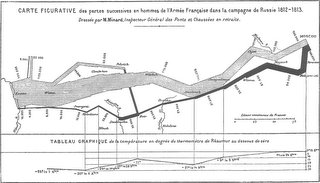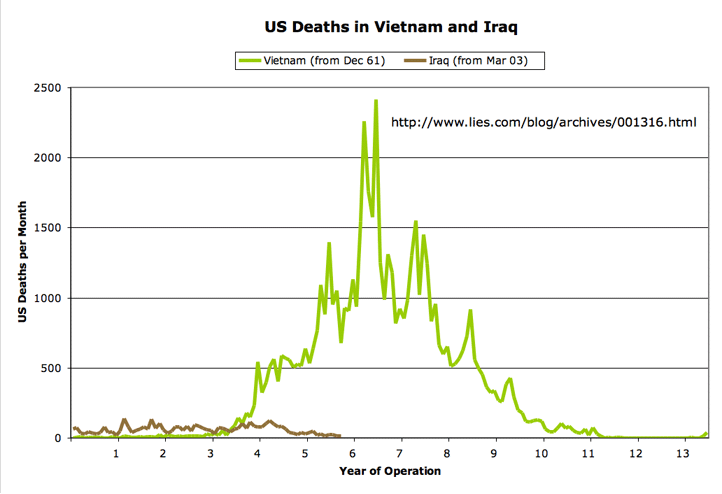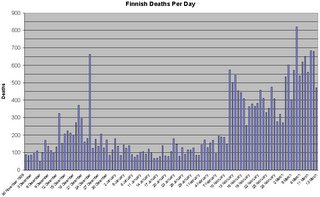This is a followup to the post about war dead in Iraq. This chart plots Iraqi and Vietnam war dead for the duration of the combat. It's an odd comparison because they began in different ways, but the startling point is the shape of the curve for Vietnam.
This next graph shows the war dead for the Finns in the Winter War against the USSR, which they won by producing a stalemate. Note a very different shape.
Now consider this famous graph, which is not the same as those above, but shows, I believe, a decrease in casualties associated with defeat.

Do any of these graphs tell us a relationship between victory and casualties? What do the Citizens think?


3 comments:
These are chilling graphs and are certainly a warning that there is no reason we should expect casualties in Iraq to decrease. At the same time, we should learn from the Finnish and Vietnamese cases that who suffers the most casualties is not a good indicator of strategic advantage in these kinds of wars.
However, I'd stop short of drawing a direct conclusion about Iraq from these other wars. There are many differences in terrain, demographics and the political situation on the ground that suggest an imperfect analogy.
All the same, supporters of this war would do well to consider this kind of information. Of course Bush recently said in an interview on PBS' News Hour that he gave no consideration at all to possible casualty rates when he was planning the invasion of Iraq. I find that offensive in the extreme. Leaving aside the obvious disregard for the human costs paid by military families, it is just bad policy to assume regime change in Iraq was worth any price at all. Insane.
Impeach Bush!
// posted by Raised By Republicans
I agree that comparisons are very, very hard to make, but I find it interesting that high casualties in Vietnam were followed not just by a drop in public support for the war, but lower casualties also. Interesting. It's also interesting that these wars don't have the steady casualty characteristic of Iraq, which suggests that it really is an occupation, not a war.
// posted by LTG
Yes. I think a better comparison to make would be French casualties in Algeria in the 1950s or German casualties in France or any other European country in the 1940s. Keeping in mind that the numbers are likely to be lower for the US because of improvements in technology and training. But the relative change in casualty rates could still be instructive.
But why bother? Bush says he never considered casualties at all. His supporters seem willing to sacrafice the lives of the living to justify the deaths of the dead. As long as such a small percentage of people are involved even indirectly in the military, what casualties that military suffers are going to be largely abstractions.
// posted by Raised By Republicans
Post a Comment